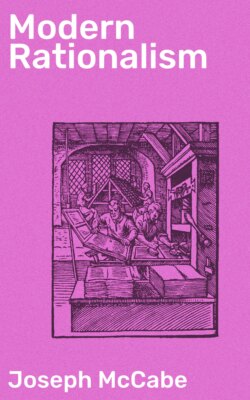Modern Rationalism

Реклама. ООО «ЛитРес», ИНН: 7719571260.
Оглавление
Joseph McCabe. Modern Rationalism
Modern Rationalism
Table of Contents
INTRODUCTION
Rationalism in Theology
MODERN RATIONALISM
Chapter II. BIBLICAL CRITICISM
Chapter III. COMPARATIVE RELIGION AND MYTHOLOGY
Chapter IV. RATIONALISM AND PHILOSOPHY
Chapter V. RELIGION AND SCIENCE
Chapter VI. RATIONALISM IN ETHICS: CONSTRUCTIVE RATIONALISM
Отрывок из книги
Joseph McCabe
The Progress of the Rationalist Spirit in the 19th Century—1897
.....
Thus the Broad Church advanced with rapid strides from year to year. There was no longer a necessity for the timid reserve and the veiled utterances of its early prophets. Their position was now fully recognised in the Church, and their speculations were practically unassailable, except by argument. They assimilated the results of modern thought with surprising facility, in the departments of higher criticism, philosophy, and science; and they continued to develop the ethical modifications of dogma of their predecessors. Indeed, now that Jowett's "Life and Letters" have been given to the world, his Rationalism is found to have been most destructive. One reviewer says of him: "He regarded them [the creeds] as extinct superstitions … He scarcely believed in a personal Deity, and less and less as life went on … He rejected miracles entirely, the Resurrection, of course, included … of the doctrine of the pardon of sins he had no conception." Mr. Mallock has happily delineated his position in "The New Republic." Dr. Jenkinson (Jowett) preaches the Sunday sermon in the private theatre, whereupon the opinion of the Agnostic professor (Huxley) is given that, apart from unavoidable matters of form, he finds himself in substantial agreement with the divine. The incident is typical of the attitude of a large section of Churchmen.
In the year after the decision on "Essays and Reviews" an important legislative measure was introduced for the express purpose of strengthening the position of the Broad Churchmen. The terms of subscription to the Thirty-nine Articles had now become a matter of grave concern to clerical aspirants with modern views of dogma and ritual and Scripture. The High Church party, though equally distant from their letter, subscribed to them with that easy elasticity of conscience which invariably comes of contact with Rome; but many of the Rationalists were much disturbed by a form of subscription which demanded an "unfeigned assent and consent to all and everything contained in the book of Common Prayer." Dean Stanley once more came to the front, and had a correspondence with Archbishop Tait on the subject. "If once," he wrote, "we press the subscriptions in their rigid and literal sense, it may safely be asserted that there is not one clergyman in the Church who can venture to cast a stone at another; they must all go out." The statement was only too evidently true, and in 1865 Lord Granville introduced a Bill in which the form of subscription was materially altered. Instead of giving an "unfeigned assent to all and everything" in the articles and book of prayer, the clergyman merely professed: "I believe the doctrine of the Church of England, as therein set forth, to be agreeable to the word of God." By accepting the doctrine (in the singular number) they were dispensed from assenting to individual dogmas, and they had no difficulty in considering that doctrine, of whose moral character they were deeply convinced, to be "agreeable to the word of God" (as expounded and expurged by the higher critics). The change has a very deep significance, and is one of the most tangible of the many signs of the times which permit us to test the strength of the Rationalistic current. As Buxton said, in the House of Commons, the Bill was introduced "to make it possible for men to minister at the altars of the church, though they might dissent from some part of her teaching." The Bill passed into law, 28 and 29 Vict., c. 122.
.....